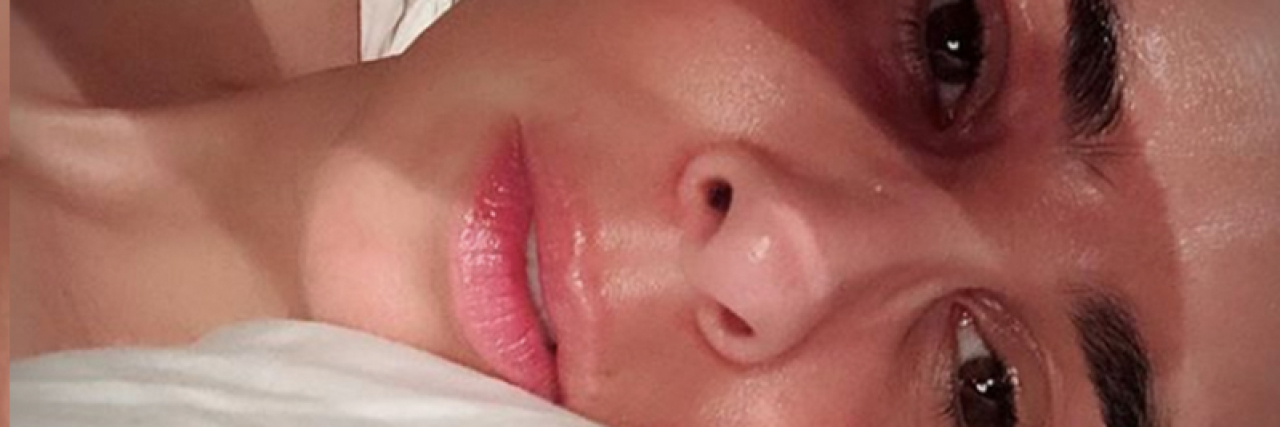With an Intimate Selfie, Sarah Silverman Shows the Reality of Antidepressant Tolerance
Editor's Note
Please see a doctor before starting or stopping a medication.
Sarah Silverman is a comedian who’s known for speaking out about the realities of depression. “It feels like I’m desperately homesick, but I’m home,” she said to Glamour in 2015, recalling the first time she remembers experiencing depression. “Something shifted inside me. It happened as fast as the sun going behind a cloud.”
To manage her depression, she told the magazine she takes a small dose of Zoloft, an SSRI, combined with therapy.
But on Sunday night, the comedian relieved on Instagram it might be time for her to make a change. Accompanied by an intimate selfie, she said her medication had stopped working. “I’ve officially built a tolerance to Zoloft and for some reason the subsequent free fall looks fucking great on me,” she wrote.
Silverman’s followers posted supportive comments, while some added her honestly made them feel less alone. “What a comfort to know my funny ladies (I’m a closeted comedian) and idols go thru what I do and ride the Zoloft train,” one commenter wrote. “So hard to believe it passes when I’m in it.”
“I know you don’t mean to be a hero by posting this, but you are. I’ve been having the same kind of month,” another wrote.
Zoloft is used to treat depression, anxiety, obsessive-compulsive disorder and can also reduce panic attacks. But not all antidepressants work for everyone, and some may stop working after a period of time. Before starting or stopping any medication, it’s important to talk to your doctor — and just as important to to be honest about how you feel. To find out when other people knew it was time to talk to their doctor about adjusting their medication, we reached out to The Mighty’s mental health community.
Here’s what they shared with us:
- “I was becoming angry all the time, no outlet for my anxiety.” — Shelly M.
- “I started showing up to work a few hours late habitually because I couldn’t get out of bed in the morning. My job is flexible enough that I didn’t face any kind of formal consequences, but I missed one committee meeting so often I was asked to reconsider whether I should stay on the committee.” — Jennifer C.
- “My meds help to manage my anxiety and bipolar disorder. They keep me from going to extremes like harming myself or wanting to end my life. When I start to feel out of control of my emotions, or I’m thinking about harming myself, I can tell the meds may need to be adjusted. The roller coaster of emotions goes up and down more often.” — Melody A.
- “I felt off. I started thinking about self-harm again. Life just got extremely difficult again. I’d have to pry myself out of bed in the morning to hush my anxiety even though my depression is screaming at me.” — Brittany S.
- “I was diagnosed at 12 and am now 36, so I’ve dealt with it for so many years that I can tell when medication stops working by my behavior and lack of motivation. When everyday tasks become chores and all my energy is used up by just trying to get out of bed. When things that will make me happy just don’t cut it anymore, it’s time to change medications.” — Christine P.
- “For me I knew it was time to change when I started having old symptoms reappear… I used an app to track my moods, self-harm, etc., and could see things changing negatively through that. So after a month-ish of things consistently going ‘backwards,’ I went in to get my meds changed.” — Aubry E.
- “I knew it was time to change my medicine when my symptoms returned. I was back in a dark place and kept creating anxious thoughts. The first sign was I started to think about self-harm again, and then I knew that it wasn’t working anymore and I needed a change. It worked for almost two years though.” — Morgan M.
Figuring out how to manage depression and anxiety is often full of ups and downs. We appreciate Silverman for being honest (and humorous) about how tough that journey can be.
Lead photo via Sarah Silverman’s Instagram

